For children, cycling brings many health benefits including increased fitness, concentration, and coordination, while providing a fun way to travel. It is also a great way for kids to navigate a city alongside their parents in a emission-free way. Dedicated spaces for children to practice cycling and build confidence are rare, especially in cities, while parents are often reluctant to let their young use bikes due to the risk of injury or nearby traffic.
In this article, we hear from three of the Active Cities partners aiming to inspire future generations to recognise and adopt active mobility as a fun, healthy transport choice.
Through the introduction of different bicycle playgrounds, Lund, Aarhus and Lille are aiming to teach their local children about the benefits of cycling, while delivering important safety lessons to remember when cycling through their cities.
Lund
For two weeks, members of the City of Lund team designed and tested a mobile “traffic playground” in Klostergården, a socio-economically mixed district in Lund. The space gave local children the opportunity to learn more about active mobility, increase their confidence when using bikes, and understand first hand the benefits and enjoyment of cycling!
Students from the local school were invited to have a lesson about traffic safety and sustainable mobility in the playground.
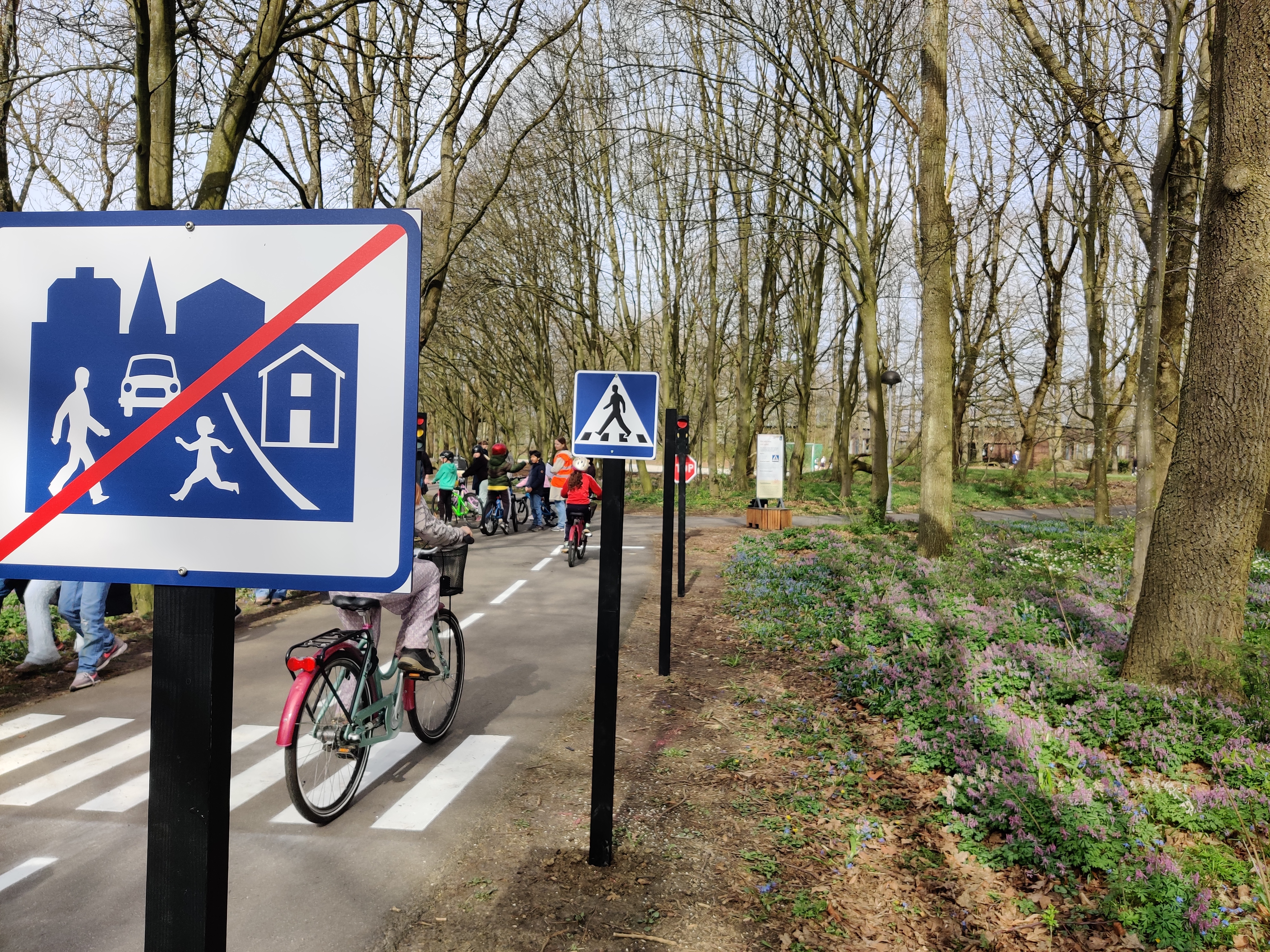
Lund's cycling playground
The initiative was implemented as part of a project called “Climate neutral Lund 2030”, which has three different focus areas with potential to level up Lund’s climate work - sustainable mobility, energy, and circular economy. The work package on sustainable mobility focuses on Klostergården and attempts to explore, develop, and test methods for increased collaboration, dialogue and involvement in issues around sustainable mobility and increased safety in existing residential areas.
The traffic playground was built for two weeks in the middle of the Klostergården district, partly as a way to highlight the topic of sustainable mobility and partly as a fun activity that invited both children and adults to spend time outside in their neighborhood, thus increasing the perceived safety.
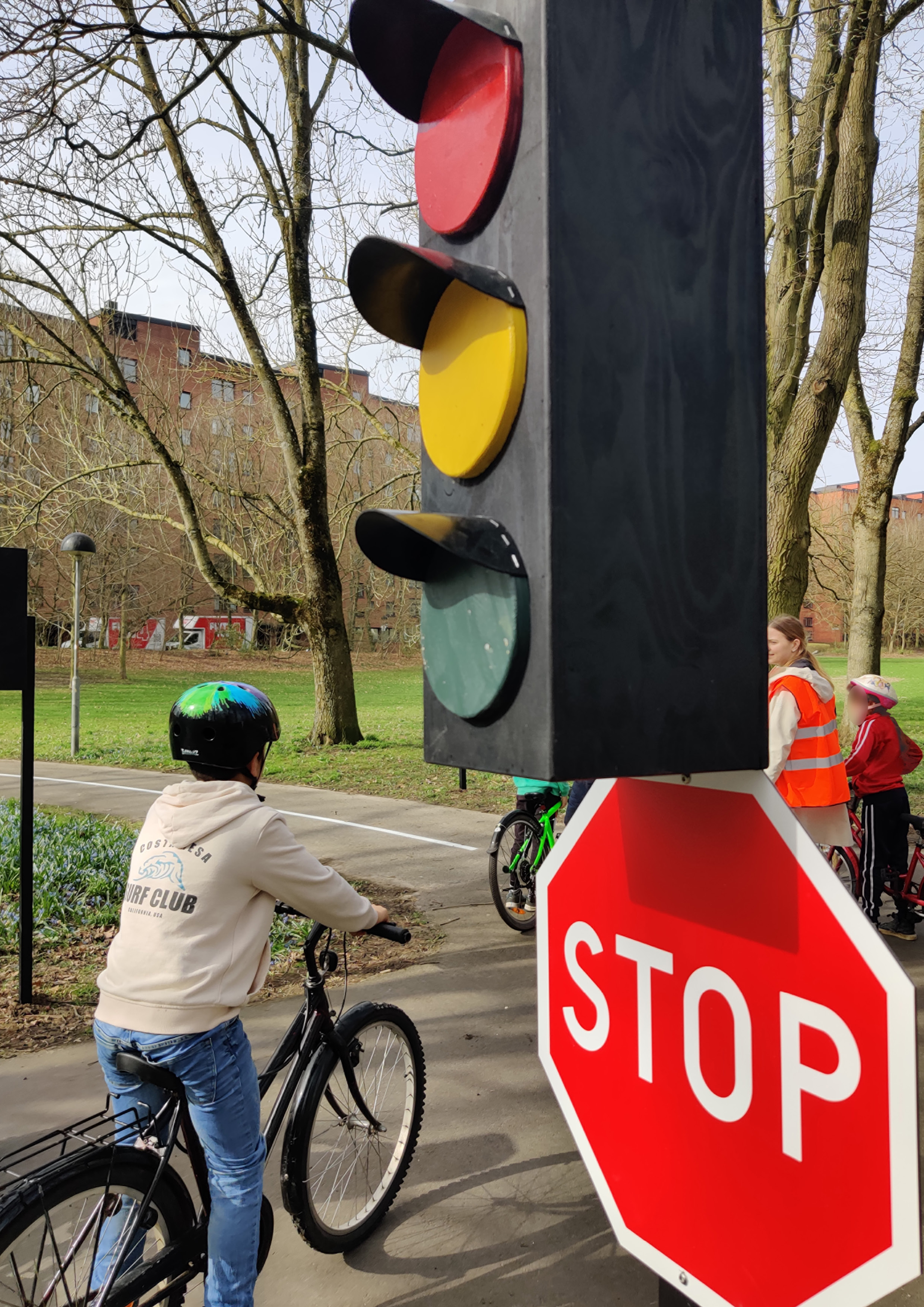
Children learning the rules of the road in Lund
Both kids and teachers were very happy to have us there, and the most frequent comment was to ask if the traffic playground could stay permanently. That is the best review we could wish for!
It is important to consider justice when talking about climate neutrality and the transition to more sustainable means of mobility. During this activity we realised that not everyone knew how to ride a bicycle or had access to a bike, something that is almost taken for granted here in Lund. Ensuring that cycling is accessible for everyone is an important step in the transition towards sustainable mobility.
The team is now investigating and planning for how they could bring the traffic playground to more districts in Lund, seeing as the activity was much appreciated by both students and teachers as well as residents in the area.
Aarhus
Aarhus Kommune have recently introduced their own initiative; Cykeløen, a bicycle playground centrally located on a former ferry dock in the city.
The project will be temporarily in place until the end of 2025, during which time schools and kindergartens from across Aarhus will have the opportunity to practice cycling and traffic skills. Many schools have small bicycle playgrounds on their premises, but Cykeløen is much bigger, allowing for more biking activities.
Thus far, City of Aarhus has mainly targeted schools and kindergartens to make use of Cykeløen. However, an aim within the project is to also provide opportunities for parents to practice cycling alongside their children. It is hoped that this initiative will allow parents to feel safer and more comfortable when cycling with their kids, and to know when their kids are ready and able to bike on their own.
Furthermore, City of Aarhus has hired an employee from Dansk Skolecykling to attend Cykeløen twice a week. His job is to teach and inspire visitors to the facility, mainly schools and kindergartens.
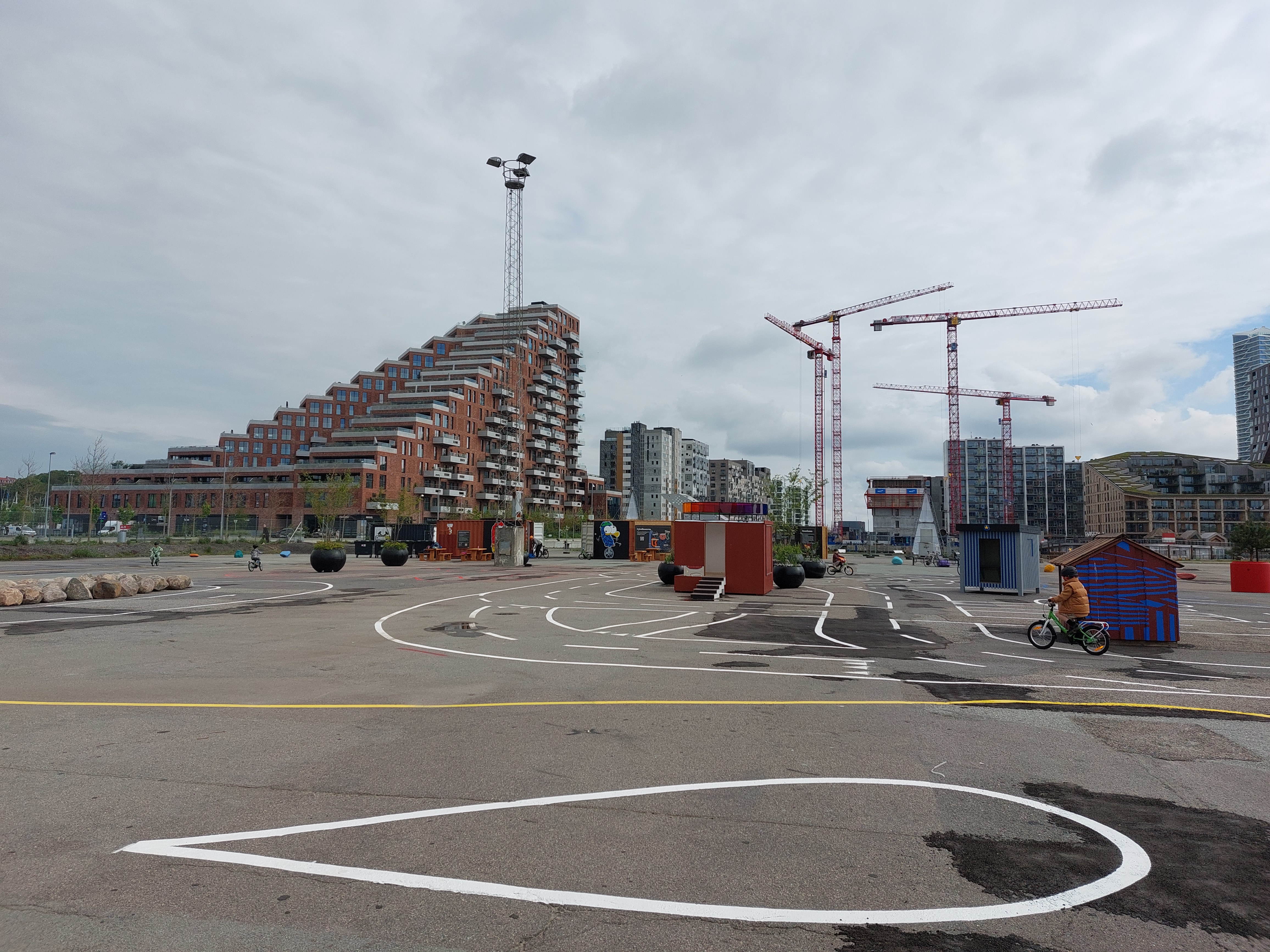
Cykeløen - The bicycle playground in Aarhus
Over a recent holiday in Aarhus, 44 families visited Cykeløen in one day, with roughly 75 children enjoying the facility for 5 hours. This shows the appetite from local families and kids to practice cycling and learn more about the benefits and safety of active mobility!
So far, it is mostly children between the ages of 5 and 7 for whom the playground is most appealing. However, the playground also welcomes older children, some of whom come by bicycle, with others on scooters or roller skates.
In relation to the process of establishing the playground, Aarhus has enjoyed success involving carpenters in training. They have been making playhouses for the site, creatively adding elements that invites children to touch, use, and play.
We are excited to see how the City of Aarhus continues to inspire local families and children to adopt cycling and active mobility as a fun, safe transport option.
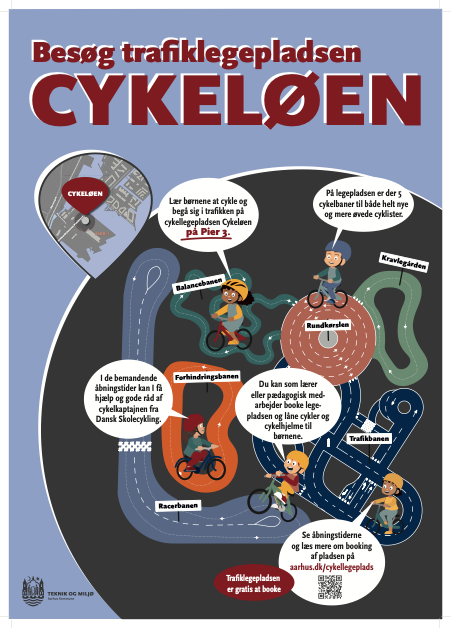
Lille
The traffic simulation playground, called “piste Junicode” or “piste d’apprentissage” is one of the main facilities of the Maison des Mobilités Durables (MMD), a recently opened mobility awareness-spreading centre centrally located between the train stations of Lille-Flandres & Lille-Europe.
The playground was designed with the help of the ADAV (Association Droit Au Vélo), the main NGO promoting active mobility in the region (Hauts-de-France) and an expert bike instruction organisation. The track aims to provide a safe, suitable place to learn how to ride a bike or become more confident around traffic. There is also a small replica of it inside the MMD to explain the exercises and prepare prior to the real practice.
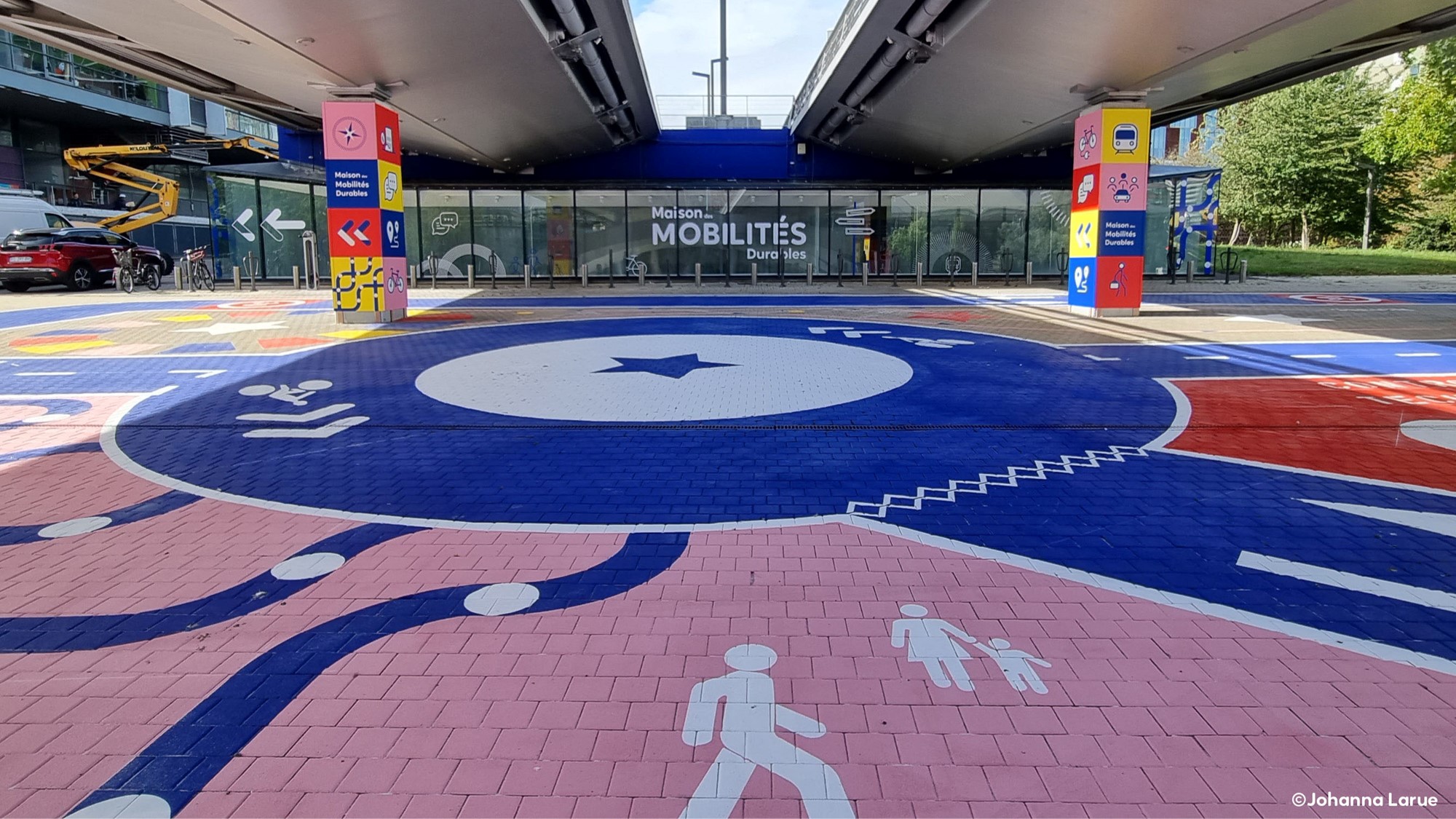
MMD's cycle playground
Currently, the ADAV is making use of the playground every week for their free bike school programme. This initiative is intended for both children and adults, with a range of sessions available for residents aged from 10 to 99+!
The playground is greatly appreciated by users, as it is the first of its kind in Lille. Before the introduction of the dedicated playground, schools and NGOs had to find alternative places to practice, including playgrounds, parking lots and squares.
Ville de Lille is now opening discussions with local schools, encouraging them to partake in learning sessions at the MMD. In France, the "Savoir Rouler à Vélo" (ability to ride a bike) scheme implemented in schools teaches every child to ride a bike by the time they start secondary school and sets the habit of using low-carbon mobility from an early age.
For now, the MMD is set to last at least until the end of 2025 but in any case, the learning track could be used after that by NGOs, schools or citizens.
This impressive initiative from the Ville de Lille shows how resources of this kind can be used effectively to create good mobility habits from an early age, encouraging children to regularly take their bikes for a spin!

MMD, Lille
